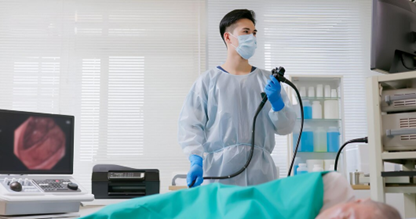A medical procedure used to examine the colon and rectum for potential abnormalities, providing valuable insights into digestive health.
Purpose and Importance
- Colonoscopy serves as a primary tool for screening colon cancer, enabling early detection when treatment is most effective, and survival rates are higher.
- It also helps diagnose and monitor gastrointestinal conditions like inflammatory bowel disease (IBD), ulcerative colitis, Crohn’s disease, and diverticulosis.
- Identifying and removing precancerous polyps during colonoscopy can prevent them from developing into cancer.
Preparation Phase
- Dietary Adjustments: Typically involves avoiding high-fiber foods, seeds, nuts, and certain medications that could affect the clarity of the colon during the procedure.
- Clear Liquid Diet: Patients are instructed to consume only clear liquids such as water, broth, tea, and gelatin the day before the procedure to ensure the colon is free of solid residue.
- Bowel Preparation: Involves taking a prescribed bowel cleansing solution to empty the colon completely. This step is crucial for optimal visualization during the colonoscopy.
The Colonoscopy Procedure
- Sedation: Patients are often given sedatives to ensure comfort during the procedure. Some may experience minimal discomfort or cramping.
- Insertion of Colonoscope: A colonoscope, a thin, tube with a light and camera at its tip, is inserted through the anus and gently guided through the entire length of the colon.
- Visualization and Examination: The camera allows the doctor to inspect the lining of the colon for abnormalities such as polyps, ulcers, inflammation, or bleeding sources.
- Biopsy or Polyp Removal: If suspicious growths or polyps are identified, they can be biopsied or removed during the procedure. Biopsies help diagnose conditions like IBD or confirm whether polyps are cancerous.
Post-Procedure Care
- Recovery: Patients are monitored briefly after the procedure to ensure they recover safely from sedation. Some may experience mild bloating or cramping initially.
- Post-Colonoscopy Instructions: Typically include dietary recommendations and activity restrictions for a brief period after the procedure.
- Follow-Up: Depending on findings, follow-up appointments may be scheduled to discuss biopsy results or monitor conditions like polyp recurrence.
Benefits and Considerations
It is essential for early detection and intervention in colon cancer, preventing its advancement. It serves as a preventive measure by removing precancerous polyps, thereby reducing the risk of colon cancer.
Colonoscopy is a crucial procedure for maintaining digestive health, offering both diagnostic and preventive benefits. Understanding its process and significance can encourage individuals to undergo recommended screenings for early detection and better management of gastrointestinal conditions.



